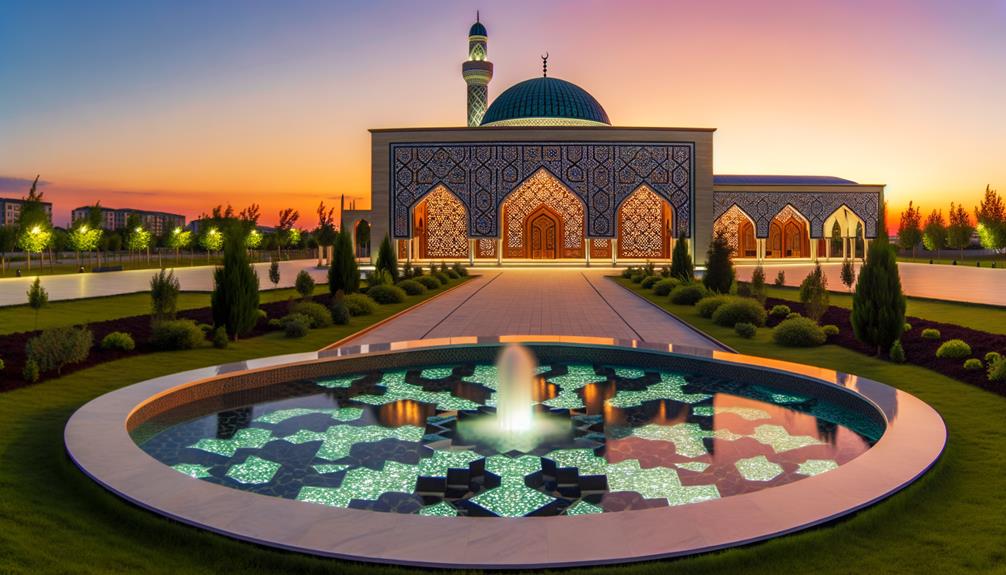Safa Name Meaning in Islam
The name 'Safa' in Islam symbolizes purity, clarity, and tranquility. Originating from the Arabic root 'ṣ-f-w,' it denotes freedom from impurities and spiritual aspiration.
In Islamic tradition, Safa is intrinsically linked to the sacred hills of Safa and Marwah in Mecca, essential in the Sa'i ritual of the Hajj pilgrimage. It represents the believer's quest for inner purity and divine closeness.
Mentioned in the Quran, Safa stands as a symbol of faith and perseverance, preserving cultural and spiritual heritage. Exploring the multifaceted significance of 'Safa' reveals its enduring impact in contemporary Islamic identities.

Key Takeaways
- Safa means purity, clarity, and serenity in Arabic.
- It symbolizes spiritual and moral purity in Islamic tradition.
- Linked to Safa and Marwah hills in Mecca, significant in Hajj pilgrimage.
- Represents faith and perseverance, mentioned as symbols of Allah in the Quran.
- Popular among Muslim families for its cultural and spiritual significance.
Origin of the Name 'Safa'
The name 'Safa' originates from the Arabic language, where it denotes purity, clarity, and serenity, deeply embedded in Islamic cultural and religious contexts. In addition to its general significance, the name has particular relevance within Islamic teachings, embodying qualities that are highly valued in the faith. The concept of ‘safiya meaning in islam‘ emphasizes the idea of being pure and sincere, traits that resonate with believers striving for a deeper spiritual connection. Thus, the name not only reflects a beautiful attribute but also serves as a reminder of the moral and ethical standards upheld in Islamic tradition.
Safa is historically significant, linked to the sacred rituals of Hajj, specifically the Sa'i, where pilgrims traverse between the hills of Safa and Marwah. This journey commemorates Hagar's search for water for her son, Ishmael.
The name's spiritual resonance is further enhanced by its association with an elevated state of spiritual and moral purity. In Islamic tradition, naming a child 'Safa' signifies an aspiration for them to embody these virtues.
This rich confluence of linguistic, historical, and religious elements underscores the profound depth and reverence associated with the name 'Safa'.
Meaning of 'Safa' in Arabic
In Arabic, the name 'Safa' encapsulates concepts of purity, clarity, and serenity, reflecting its profound spiritual and moral connotations within Islamic tradition. The term 'Safa' (صفا) is derived from the root word 'ṣ-f-w' (ص-ف-و), which signifies cleanness and transparency. This nomenclature embodies:
- Purity: Symbolizing a state free from impurities, both physical and spiritual.
- Clarity: Representing clear, unambiguous understanding and thought.
- Serenity: Denoting calmness and tranquility, often associated with inner peace.
These attributes are not merely linguistic but carry deep resonance in the ethical and spiritual ethos of Islam, making 'Safa' a name that is revered and respected in the Islamic world.
Spiritual Significance in Islam
Embodying profound spiritual ideals, 'Safa' holds significant importance in Islamic tradition, symbolizing the quest for inner purity and divine tranquility. The term 'Safa' is intrinsically linked to the Safa and Marwah hills in Mecca, pivotal in the Hajj pilgrimage. This connection underscores the spiritual journey towards self-purification, echoing the trials of Hajar as she sought sustenance for her son, Ismail, in the desert. It reflects a deeper, universal human yearning for divine connection and guidance.
| Aspect | Description | Emotional Resonance |
|---|---|---|
| Inner Purity | Aspiring for a clean heart and soul | Peace and clarity |
| Divine Tranquility | Attaining serenity through faith | Comfort and solace |
| Spiritual Journey | Symbolism of pilgrimage in Hajj | Inspiration and devotion |
| Connection to Hajar | Enduring trials with faith | Strength and perseverance |
This spiritual significance profoundly shapes a believer's life, fostering a deeper connection to their faith.
Cultural Importance
Safa's cultural importance in Islam extends beyond its spiritual symbolism. It deeply influences various aspects of Muslim life and tradition. This influence manifests in multiple domains, reflecting the enduring relevance of Safa in the collective consciousness of the Muslim community.
Naming Tradition: The name 'Safa' is frequently chosen for girls, symbolizing purity and connection to the sacred rites of Hajj.
Literature and Poetry: Safa often appears in Islamic literature and poetry, embodying themes of spiritual journey and divine closeness.
Architectural Design: Elements of Safa and Marwah are incorporated into mosque designs and other Islamic structures, serving as a perpetual reminder of the spiritual and cultural legacy.
These aspects underscore Safa's profound cultural resonance in Islam.
Historical Context
The name Safa holds significant historical resonance in Islamic tradition, with early references rooted in the sacred texts and practices established by the Prophet Muhammad.
Historically, Safa is intrinsically linked to the ritual of Sa'i, performed during the Hajj pilgrimage, underscoring its deep cultural and religious importance.
Today, the name continues to carry profound cultural significance, reflecting a rich heritage that spans centuries.
Early Islamic References
In early Islamic history, the name Safa is prominently associated with the revered Safa and Marwah hills in Mecca, which hold significant religious importance due to their connection with the story of Hagar and her son Ishmael. These hills represent the following:
- Symbol of Faith: Hagar's desperate search for water between Safa and Marwah is commemorated during the Hajj pilgrimage.
- Qur'anic Mention: The Qur'an mentions Safa and Marwah as symbols of Allah, underscoring their sanctity (Surah Al-Baqarah, 2:158).
- Historical Ritual: The act of Sa'i, walking between the two hills, is an essential rite, symbolizing perseverance and divine providence.
These elements establish Safa's profound historical and religious context within Islam.
Cultural Significance Today
Building on the historical and religious foundations, the name Safa continues to hold profound cultural significance in contemporary Islamic societies. Rooted in the Quranic narrative of Safa and Marwah, these names are synonymous with faith, patience, and the divine trials of Hagar. Furthermore, the importance of names within Islamic culture often extends beyond mere identification, serving as reminders of faith and spirituality. In particular, the sahana name significance in Islam highlights the intrinsic connection between names and their meanings, fostering a sense of identity and belonging among the community. As such, names like Safa and Marwah serve not only as historical references but also as sources of inspiration for generations seeking to embody the values of their faith.
Today, the name Safa is often chosen for its spiritual resonance and symbolic association with purity and clarity. Parents bestow this name upon their children to invoke the virtues exemplified by Hagar's unwavering faith.
In addition, Safa remains a popular name in various Islamic cultures, reflecting communal values and cultural continuity. This enduring relevance underscores Safa's role not merely as a name, but as a living demonstration to enduring faith and cultural heritage.
'Safa' in Islamic Texts
'Safa' holds substantial mention in Islamic texts, especially within the Quran and Hadith. The Quranic references to Safa, particularly in the context of the sacred rites of Hajj, underscore its religious importance.
Additionally, Hadith literature provides further insights into the spiritual and historical significance of Safa, enriching its meaning within the Islamic tradition.
Quranic References to Safa
The significance of Safa as mentioned in the Quran is deeply rooted in its connection to the sacred rituals of Hajj and Umrah, specifically highlighted in Surah Al-Baqarah (2:158). This verse underscores the importance of Safa and Marwah as symbols of Allah, integral to the pilgrimage rites.
Quranic Verse: 'Indeed, Safa and Marwah are among the symbols of Allah. So whoever makes Hajj to the House or performs Umrah – there is no blame upon him for walking between them.' (Al-Baqarah 2:158)
Symbolism: Safa represents patience and perseverance, reflecting Hajar's (Hagar) search for water.
Ritual Practice: Pilgrims perform Sa'i, walking seven times between Safa and Marwah, embodying Hajar's devotion and faith.
Safa in Hadith
In the Hadith, references to Safa further elucidate its spiritual significance and the Prophet Muhammad's (peace be upon him) practices during Hajj and Umrah. The Prophet's actions at Safa and Marwah, as recorded in Sahih Bukhari and Sahih Muslim, highlight the essential rites of Sa'i, where pilgrims traverse between the two hills.
This act commemorates Hajar's (Hagar's) search for water for her son, Isma'il (Ishmael). The Prophet's supplications and the specific manner in which he undertook this ritual offer profound insights into its importance. His adherence to these actions signifies their divine endorsement and underscores Safa's enduring role in Islamic worship, symbolizing faith, perseverance, and divine mercy.
Popularity and Modern Usage
Although the name Safa has deep historical and religious roots, its popularity and modern usage have seen a resurgence in contemporary Muslim communities worldwide. This resurgence can be attributed to several factors that resonate with both traditional and modern sensibilities.
- Cultural Reconnection: Many Muslim families are choosing the name Safa to honor their heritage and maintain a connection to Islamic history and traditions.
- Global Influence: Increased global interconnectedness has popularized names like Safa across diverse Muslim and non-Muslim populations, emphasizing its universal appeal.
- Phonetic Appeal: The name Safa is favored for its melodious and simple phonetic structure, making it easy to pronounce and remember across different languages and cultures.
This modern embrace highlights the enduring significance of the name Safa.
Conclusion
The name 'Safa' holds profound significance in Islamic culture, symbolizing purity, clarity, and spiritual elevation.
An interesting statistic reveals that in 2020, 'Safa' ranked among the top 100 names for newborn girls in several Muslim-majority countries, highlighting its enduring popularity.
This statistic underscores the name's deep-rooted cultural and religious resonance, reflecting a timeless connection to Islamic heritage and values.
The multifaceted importance of 'Safa' in historical, religious, and contemporary contexts continues to inspire and evoke reverence.






